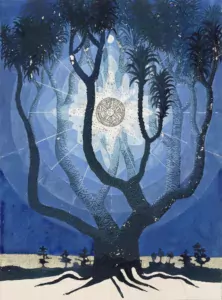A Spirituality of Descent by Giovanni Perez
Sam is a brother in the Illuman family whose story I have permission to share. He serves faithfully and is full of joy and presence. Over the last few years, in tandem with his brother, he has been taking care of his 98-year-old father, who requires 24/7 care. During this time, Sam has seen his father’s transformation from a macho “¡mis chicharrones son los que truenan aquí!” (Spanish for “I’m right and you are wrong!”) to a very gentle and vulnerable old man. These circumstances have also brought Sam deep personal transformation. With both a wide smile and tears in his eyes, he says: “The man I am caring for is not the same man that raised me. I love this man!” Sam also shares that caring for his father is “hard work, but this is work I wanna do.”
Father Ronald Rolheiser, OMI, recently gave a talk in which he shared a similar story. An old man, who lived nothing less than an “imperfect” life, spent a long time dying. By the time this man died, he had become a different man. He was tender and gentle, unlike the tough man that had lived well into his nineties. At this man’s funeral, a family member shared that the reason why he lived a very long life was that God was still working on him, making him tender and ready. After telling this story, Rolheiser reflected on how, when Jacob fought the angel (c.f. Gen. 32:22ff), the angel left him wounded. Jacob, however, knew that this was not something to recoil from, to regret or to lament, but rather something to embrace, for this wound carried some inexplicable blessing from beyond.
The work that we do in Illuman, as Richard Rohr has said in many different ways, is more about subtraction than addition, more about letting go than attaining. It is the path of descent. Sooner or later, we come to realize that after climbing the ladder, we have actually placed it against the wrong wall (to use Thomas Merton’s memorable image). Commentator David Brooks shares the same view of the two mountains that we climb. The first is the mountain of success and achievement, which, when we get to the top, we realize that it is empty and unfulfilling. Then we are called to climb the second mountain, the one that is more about living a life dedicated to others much more than being consumed with ourselves.
Beware that success has many faces. If we believe that we have left the mundane world of riches, fame, and glory, we may soon be tempted to become “great” spiritual guides, or great retreat masters, or—even worse—great contemplatives. Success can easily disguise itself as spiritual and religious perfection, leading us to engage in some sort of spiritual athletics, to seek to be the best at the religious and spiritual stuff.
The work we do in the company of our Illuman brothers is about shedding, about continuously shedding our false selves. This journey ought to last an entire life. One of the teachings that has stayed with me from the time I went through the Men’s Rites of Passage and through many years since, was about not caring—in fact, about intentionally dismissing all titles that would give someone a false sense of importance. Each man was to be called by his name, regardless of whether he was a doctor, a lawyer, or a priest. This is a practical way of descending from whatever ladder of success they or we have climbed.
That’s who we are, my dear brothers: simple men who are naked underneath our clothes and who wish nothing more than to be counted amongst other men in the search for the true self. We know that if we keep on climbing, we will become old fools, seeking successes and vain glories and living with no soul, no passion, and no integrity. The path of descent, on the other hand, is the path of the Holy Fool, the man who, in the last years of his life, knows that he requires his son to change his diapers, and give him a bath, and care for him. He recognizes that the only thing he can actually do in return is to say: “I love you mijo, y muchas gracias.”

You are probably familiar with Rainer Maria Rilke’s powerful poem “The Man Watching.” Let me offer it to you once again:
The Man Watching
By Rainer Maria Rilke
I can tell by the way the trees beat, after
so many dull days, on my worried windowpanes
that a storm is coming,
and I hear the far-off fields say things
I can’t bear without a friend,
I can’t love without a sister.
The storm, the shifter of shapes, drives on
across the woods and across time,
and the world looks as if it had no age:
the landscape, like a line in the psalm book,
is seriousness and weight and eternity.
What we choose to fight is so tiny!
What fights with us is so great.
If only we would let ourselves be dominated
as things do by some immense storm,
we would become strong too, and not need names.
When we win it’s with small things,
and the triumph itself makes us small.
What is extraordinary and eternal
does not want to be bent by us.
I mean the Angel who appeared
to the wrestlers of the Old Testament:
when the wrestlers’ sinews
grew long like metal strings,
he felt them under his fingers
like chords of deep music.
Whoever was beaten by this Angel
(who often simply declined the fight)
went away proud and strengthened
and great from that harsh hand,
that kneaded him as if to change his shape.
Winning does not tempt that man.
This is how he grows: by being defeated, decisively,
by constantly greater beings.
—Translated by Robert Bly








Leave a Reply
Your email is safe with us.
You must be logged in to post a comment.